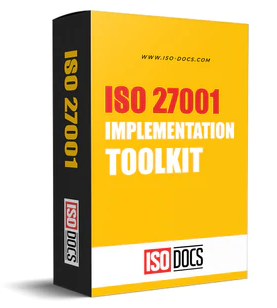Who Needs ISO 27001?
In today's rapidly evolving digital landscape, information security has become a critical concern for organizations of all sizes and across various industries. With the proliferation of digital technologies, interconnected systems, and data-driven operations, safeguarding sensitive information has taken center stage.

This is where ISO 27001, the internationally recognized standard for information security management, comes into play. But who exactly needs ISO 27001, and how can it benefit different types of organizations? Let's explore the diverse range of entities that can benefit from ISO 27001 and understand why it's a crucial investment in the modern business world.
Understanding ISO 27001
In an era where digital information has become the lifeblood of modern organizations, safeguarding its confidentiality, integrity, and availability has become paramount. ISO 27001, a foundational component of the ISO/IEC 27000 series, provides a systematic approach to managing information security risks and establishing an effective Information Security Management System (ISMS).
At its core, ISO 27001 is designed to help organizations identify, assess, and mitigate information security risks in a structured and comprehensive manner. It sets out guidelines for developing policies, procedures, and controls that address a wide range of potential threats, including cyberattacks, data breaches, and insider threats. By implementing ISO 27001, organizations can create a culture of security awareness, ensuring that every member of the workforce plays a role in protecting sensitive information.
1] Large Enterprises
Large corporations handling vast amounts of data, customer information, and proprietary knowledge are prime candidates for ISO 27001. The standard helps these organizations establish a comprehensive framework to manage and mitigate risks associated with cyber threats, data breaches, and regulatory compliance. ISO 27001 provides a structured approach to ensure the security, integrity, and availability of critical information assets, fostering trust among stakeholders and customers.
2] Small and Medium-sized Enterprises (SMEs)
Contrary to the misconception that ISO standards are only suitable for large enterprises, ISO 27001 holds immense value for SMEs as well. In fact, SMEs often lack the extensive resources and dedicated security teams that larger organizations have. ISO 27001 enables SMEs to implement a cost-effective and scalable security framework, enhancing their ability to secure sensitive information, build customer trust, and compete in an increasingly digital marketplace.
3] Healthcare Industry
The healthcare industry stands on the precipice of a technological revolution, with digital advancements promising improved patient care, enhanced diagnostics, and streamlined operations. As medical institutions digitize patient records, leverage telemedicine, and adopt Internet of Things (IoT) devices, they also expose themselves to heightened cybersecurity risks. In this rapidly evolving landscape, ISO 27001 emerges as a critical asset for safeguarding patient data and ensuring the integrity of healthcare systems.
4] Financial Institutions
Financial institutions are entrusted with managing vast financial assets and confidential client data. Any breach in their security could lead to severe financial losses and damage to their reputation. ISO 27001 assists banks, investment firms, and other financial entities in fortifying their information security framework, adhering to industry-specific regulations, and minimizing the risk of fraud, data breaches, and identity theft.
5] E-commerce and Retail
The e-commerce and retail sectors rely heavily on online transactions and customer data. Ensuring the security of payment information, personal details, and transaction histories is paramount to building trust and sustaining business growth. ISO 27001 aids e-commerce businesses in creating a secure environment for online transactions, safeguarding customer data, and maintaining compliance with data protection laws such as the General Data Protection Regulation (GDPR).
6] Government and Public Sector
Government agencies handle a wide array of sensitive information, ranging from citizen records to national security data. ISO 27001 offers a structured approach for government entities to enhance their cybersecurity measures, protect critical infrastructure, and ensure the confidentiality of classified information. By adopting ISO 27001, governments can foster a culture of security awareness and demonstrate their commitment to safeguarding citizens' interests.
7] Benefits Beyond Security
While the primary focus of ISO 27001 is information security, its implementation yields several additional benefits. These include improved operational efficiency, streamlined processes, reduced downtime due to security incidents, enhanced customer trust, and a competitive edge in the market. ISO 27001 can also facilitate collaboration with partners, suppliers, and customers who prioritize secure business relationships.

ISO 27001: A Vital Investment for Thriving in the Modern Business Landscape
- Risk Management: ISO 27001's systematic framework identifies and mitigates information security risks, fortifying overall risk management against evolving cyber threats and data breaches.
- Trust and Reputation: In a digitally connected world, ISO 27001 certification underscores an organization's commitment to robust security practices, fostering stakeholder trust and credibility.
- Compliance: ISO 27001's structured approach ensures alignment with data protection laws, reducing non-compliance risks and legal liabilities.
- Incident Response: The standard's emphasis on incident planning equips businesses to swiftly and effectively address security breaches, minimizing downtime and damages.
- Competitive Edge: ISO 27001 certification signals a dedication to data protection, attracting security-conscious customers and driving growth.
- Resource Efficiency: ISO 27001's continuous improvement focus optimizes security processes, cutting operational costs and crisis management.
- Digital Empowerment: By integrating security into technological adoption, ISO 27001 empowers confident and secure digital transformation, keeping organizations ahead of evolving threats.
Conclusion
In an age of digital innovation and increased connectivity, the need for robust information security practices has never been more pressing. ISO 27001 provides a comprehensive framework that transcends industry boundaries, enabling organizations of all sizes and sectors to fortify their information security measures, build trust, and demonstrate their commitment to protecting valuable data assets. Whether you're an SME aiming to establish a secure online presence or a government agency safeguarding national interests, ISO 27001 offers a versatile and adaptable solution to address the evolving challenges of the digital era. By embracing ISO 27001, organizations can confidently navigate the digital landscape while safeguarding their future and the trust of their stakeholders.


